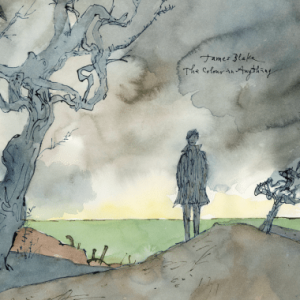Since he released his sophomore album ‘Overgrown’ back in 2013, James Blake has certainly kept busy. In between setting up a new label as part of the 1-800-Dinosaur collective, securing a residency on BBC Radio 1 and working with Frank Ocean, he even appeared on the new Beyoncé album. However, even Blake himself couldn’t have imagined how that appearance would set up his new album perfectly, giving new listeners a chance to dive straight in.
If the release of ‘Lemonade’ garnered worldwide attention, then the release of ‘The Colour In Anything’ was under the radar by comparison. Blake was never one to crave the spotlight anyway, so the stealth release of his new album didn’t come as a big surprise.
‘The Colour In Anything’ feels a bit looser than his previous efforts and less fussed over, which shows how much Blake has evolved. This time around, creating the album was more of a collaborative process. Blake worked with Frank Ocean and Justin Vernon of Bon Iver on My Willing Heart. Blake and Ocean combine beautifully as their falsettos interweave throughout the track. Vernon and Blake on the other hand, combine in a very different, but no less effective way. I Need A Forest Fire is far removed from Blake’s usual moody electronic ballads. It’s brimming with optimism – instead of dwelling in the gloom – Blake sees the value in starting afresh.
He doesn’t abandon his sombre tendencies entirely on the album; he refines his emotional palette instead. Love Me In Whatever Way sees him express this is in a very direct way when he sings “It’s the thorns I want and the bloom I always fear,” it’s this fear of change and sense of desperation which is usually associated with Blake. However, as the song opens out in the chorus he sings, “Love me in whatever way”, which suggests a change in his ways. You get a sense that he has become more open as an artist and as a person.
This newfound openness also spills over into the song writing. He is more willing to experiment and with 17 tracks on the album he doesn’t want to pare things back either. The album as a whole feels like a collection of ideas, but instead of the themes becoming muddled together, there is a certain synthesis to it all. The more intimate moments convey a tonal shift on the album, which is in contrast to the more aggressive electronic tracks. These impressive shifts in tone highlight how much James Blake has matured as an artist.
Ultimately, the album sees Blake leave himself more open than ever before in an attempt to come to terms with his broken relationships. Throughout the album he displays his desperation as he clings onto what he has left. But as he sings on Modern Soul “The smaller the wave you let me down, no longer I will defend you” there is also a sense of defiance and individualism. In truth that is what this album is, an individual’s artistic vision seen through to the very end, and in the end it’s all consuming.



